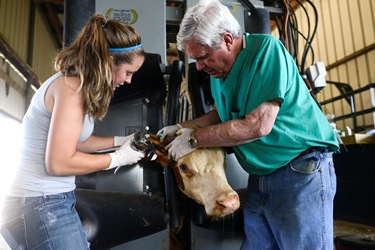NEWS
Louisiana Tech merges Department of Agricultural Sciences, School of Forestry
Louisiana Tech University has received approval from the Board of Regents and the University of Louisiana System Board of Supervisors to merge its Department of Agricultural Sciences and School of Forestry in to a single School of Agricultural Sciences and Forestry within the College of Applied and Natural Sciences.
The merger of these two units, which are closely aligned in academic areas related to natural resources and consolidation, will create a number of new learning, research and collaboration opportunities for both students and faculty. It would also encourage strong interdisciplinary interactions in teaching and outreach, and allow for greater efficiencies in administrative and staffing costs.

“Given that all of the degree programs in agricultural sciences and forestry are natural resources related, merging the two units together is a natural fit,” said Dr. Gary Kennedy, dean of Louisiana Tech’s College of Applied and Natural Sciences. “The newly formed School of Agricultural Sciences and Forestry will give Louisiana Tech’s South Campus a larger and more unified presence, and will add several efficiencies.
“In the past, for example, both groups have hosted district and state FFA career development events that bring many high school students to the Louisiana Tech campus. Now, one school will coordinate those events. In addition, student recruiting will be enhanced and more efficient, with targeted recruitment strategies that will cover more geographic areas.”
Kennedy said the degree programs that are currently in place will not be affected, so current students will not see a change in curricula or courses offered due to the merger.
Dr. William Green, professor of agricultural sciences in the College of Applied and Natural Sciences, will serve as interim director of the new School of Agricultural Sciences and Forestry.
“I feel this merger is a benefit to the university and the students,” said Green. “We will now be combining resources of two very complex units and this should result in more efficient use of personnel, equipment, and facilities by the university and the students.
The consolidation of the Department of Agricultural Sciences and School of Forestry would reduce the number of academic units within the College of Applied and Natural Sciences from six to five. The proposed School of Agricultural Sciences and Forestry would be second to the School of Biological Sciences in terms of the number of undergraduate students per unit within the College of Applied and Natural Sciences.
As interim director, Green said he looks forward to leading the effort of these two very complex units being blended into one efficient unit.
“The result I am hoping to achieve is that the School of Agricultural Sciences and Forestry will become recognized for identifying, recruiting, retaining, educating, and developing agriculture and forestry students so they will become positive additions to society,” Green said.
The merger of these two units, which are closely aligned in academic areas related to natural resources and consolidation, will create a number of new learning, research and collaboration opportunities for both students and faculty. It would also encourage strong interdisciplinary interactions in teaching and outreach, and allow for greater efficiencies in administrative and staffing costs.

Dr. William Green (right) will serve as interim director of Louisiana Tech’s new School of Agricultural Sciences and Forestry.
“Given that all of the degree programs in agricultural sciences and forestry are natural resources related, merging the two units together is a natural fit,” said Dr. Gary Kennedy, dean of Louisiana Tech’s College of Applied and Natural Sciences. “The newly formed School of Agricultural Sciences and Forestry will give Louisiana Tech’s South Campus a larger and more unified presence, and will add several efficiencies.
“In the past, for example, both groups have hosted district and state FFA career development events that bring many high school students to the Louisiana Tech campus. Now, one school will coordinate those events. In addition, student recruiting will be enhanced and more efficient, with targeted recruitment strategies that will cover more geographic areas.”
Kennedy said the degree programs that are currently in place will not be affected, so current students will not see a change in curricula or courses offered due to the merger.
Dr. William Green, professor of agricultural sciences in the College of Applied and Natural Sciences, will serve as interim director of the new School of Agricultural Sciences and Forestry.
“I feel this merger is a benefit to the university and the students,” said Green. “We will now be combining resources of two very complex units and this should result in more efficient use of personnel, equipment, and facilities by the university and the students.
The consolidation of the Department of Agricultural Sciences and School of Forestry would reduce the number of academic units within the College of Applied and Natural Sciences from six to five. The proposed School of Agricultural Sciences and Forestry would be second to the School of Biological Sciences in terms of the number of undergraduate students per unit within the College of Applied and Natural Sciences.
As interim director, Green said he looks forward to leading the effort of these two very complex units being blended into one efficient unit.
“The result I am hoping to achieve is that the School of Agricultural Sciences and Forestry will become recognized for identifying, recruiting, retaining, educating, and developing agriculture and forestry students so they will become positive additions to society,” Green said.
Recent Comments